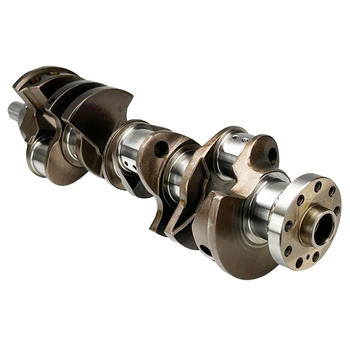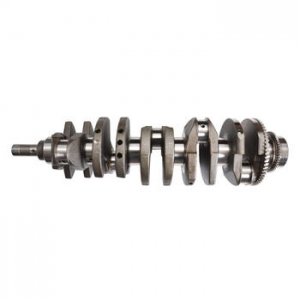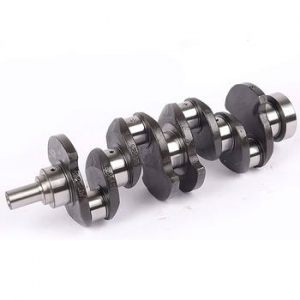Unlock Chevy 350 Power: The Ultimate Crankshaft Guide
The Chevrolet 350 cubic inch small-block engine is a true icon in the automotive world. For decades, it has powered everything from family sedans to high-performance sports cars and trucks. At the heart of this legendary engine lies the crankshaft, a critical component responsible for converting the linear motion of pistons into rotational force that drives your vehicle. Understanding the chevy 350 crankshaft is paramount for anyone looking to maintain, repair, or upgrade their engine for enhanced performance and reliability. This article dives deep into the world of Chevy 350 crankshafts, exploring their types, materials, selection criteria, and how to ensure you're choosing the right one for your specific needs.
Understanding the Vital Role of the Crankshaft
To truly appreciate the significance of the chevy 350 crankshaft, it's essential to grasp its fundamental function within the engine. Imagine the controlled explosions happening within the engine cylinders – these explosions push pistons up and down. The crankshaft, with its offset journals, acts as a central pivot point that transforms this reciprocating, up-and-down motion into rotary motion. This rotational force is then transmitted through the drivetrain to ultimately turn the wheels and propel your vehicle forward. The crankshaft endures immense stress and pressure with every engine revolution. It must be incredibly strong, precisely balanced, and manufactured to exacting tolerances to withstand these forces and ensure smooth, efficient engine operation. A properly functioning crankshaft is not just about power; it's about the longevity and reliability of your entire engine.
Exploring Different Types of Chevy 350 Crankshafts
When it comes to chevy 350 crankshaft options, you'll encounter a variety of types, each designed for specific applications and performance levels. The most common type is the cast crankshaft, often made from nodular iron. Cast crankshafts are typically found in stock or mildly modified engines and offer a good balance of strength and affordability for everyday driving. For higher performance applications, forged crankshafts are the preferred choice. Forged crankshafts are manufactured through a process that aligns the grain structure of the metal, resulting in significantly increased strength and durability compared to cast versions. This makes them ideal for engines subjected to higher RPMs, increased horsepower, and demanding conditions, such as racing or towing. Finally, billet crankshafts represent the pinnacle of crankshaft technology. Machined from a solid block of steel, billet crankshafts offer the ultimate in strength, precision, and customization, but come at a higher cost. These are typically reserved for top-tier racing engines or custom, high-horsepower builds where no compromise on performance is acceptable.
Material Matters: Choosing the Right Crankshaft Material
The material composition of a chevy 350 crankshaft plays a crucial role in its strength, durability, and overall performance. As mentioned earlier, cast crankshafts are often made from nodular iron, a type of cast iron with improved strength compared to standard cast iron. However, for enhanced performance and robustness, forged crankshafts are typically crafted from various grades of steel alloys. 4340 steel is a popular choice for forged crankshafts, known for its excellent tensile strength and fatigue resistance, making it well-suited for high-performance street and racing engines. For extreme applications, even stronger alloys like 4340M or even proprietary blends might be used. These materials can withstand incredibly high stresses and temperatures, ensuring the crankshaft's integrity under the most demanding conditions. The choice of material directly impacts the crankshaft's ability to handle increased horsepower, RPM, and engine stress, so selecting the appropriate material is critical for engine longevity and performance goals.
Selecting the Perfect Chevy 350 Crankshaft for Your Build
Choosing the right chevy 350 crankshaft is a critical decision that hinges on your engine's intended use and performance goals. Are you rebuilding a stock engine for reliable daily driving, or are you aiming for a high-horsepower performance build? For a stock rebuild or mild street performance upgrade, a quality cast crankshaft may be sufficient and cost-effective. However, if you're planning to increase horsepower significantly, run higher RPMs, or subject your engine to demanding conditions like racing or towing, investing in a forged crankshaft is highly recommended. Consider your target horsepower and RPM range. Higher horsepower and RPMs necessitate stronger crankshafts, typically forged or billet. Think about the intended application – street driving, drag racing, road racing, or towing – as each application places different demands on the crankshaft. Also, factor in your budget. Forged and billet crankshafts are more expensive than cast versions, so balance your performance needs with your financial constraints. Properly assessing these factors will ensure you select a crankshaft that meets your performance requirements and provides long-term reliability.
Installation and Maintenance Considerations
While the chevy 350 crankshaft itself is a robust component, proper installation and ongoing maintenance are essential to ensure its longevity and optimal performance. Crankshaft installation is not a DIY job for beginners and typically requires specialized tools and expertise. It's crucial to ensure correct bearing clearances, proper lubrication, and precise torque specifications during installation. Improper installation can lead to premature wear, bearing failure, and even crankshaft damage. Regular engine maintenance, including oil changes with high-quality oil and filter, plays a vital role in crankshaft health. Clean oil provides essential lubrication and cooling, reducing friction and wear on the crankshaft bearings. Monitoring engine oil pressure is also important, as low oil pressure can indicate lubrication issues that could damage the crankshaft and bearings. If you notice unusual engine noises, vibrations, or oil pressure fluctuations, it's crucial to investigate promptly as these could be signs of potential crankshaft or bearing problems. Regular preventative maintenance and professional installation are key to maximizing the lifespan of your Chevy 350 crankshaft.
Common Issues and Troubleshooting with Crankshafts
Even with proper care and maintenance, chevy 350 crankshafts can sometimes experience issues over time, especially in high-mileage or performance engines. One common problem is crankshaft bearing wear. Over time, engine bearings can wear down due to friction and contamination, leading to increased clearances and potential crankshaft damage. Symptoms of bearing wear can include engine knocking or rumbling noises, especially at lower RPMs, and decreased oil pressure. Crankshaft journals, the surfaces where bearings ride, can also become damaged due to wear, scoring, or overheating. Journal damage can necessitate crankshaft grinding or even replacement. In extreme cases, crankshafts can crack or fracture, particularly in high-stress applications or due to manufacturing defects, although this is less common with quality crankshafts. If you suspect a crankshaft issue, a thorough engine inspection by a qualified mechanic is crucial. This may involve checking bearing clearances, inspecting crankshaft journals for damage, and potentially even removing the crankshaft for a detailed examination. Early diagnosis and repair can prevent more significant engine damage.
Upgrading Your Crankshaft for Enhanced Performance
For enthusiasts seeking to maximize the performance of their Chevy 350 engine, upgrading the chevy 350 crankshaft can be a significant step. Upgrading from a cast crankshaft to a forged or billet crankshaft is a common modification for those building higher horsepower engines. Forged crankshafts, with their increased strength, allow engines to safely handle higher RPMs, increased cylinder pressure, and forced induction (like supercharging or turbocharging). Furthermore, performance crankshafts are often designed with optimized counterweights and knife-edged profiles to reduce rotating mass, leading to quicker engine revving and improved throttle response. Some performance crankshafts also offer increased stroke, which, when combined with other engine modifications, can increase engine displacement and overall torque output. When considering a crankshaft upgrade, it's crucial to carefully match the crankshaft to your engine's overall build goals, including desired horsepower, RPM range, and intended use. Consulting with engine building professionals can help ensure you select the right performance crankshaft to achieve your desired results without compromising engine reliability.
The chevy 350 crankshaft is a cornerstone of this iconic engine, playing a vital role in power production and engine longevity. Understanding the different types, materials, and selection criteria is crucial for anyone working with or modifying a Chevy 350 engine. Whether you're undertaking a stock rebuild or pushing the boundaries of performance, choosing the right crankshaft and ensuring proper installation and maintenance will significantly impact your engine's reliability and power output. By investing in quality components and adhering to best practices, you can unlock the full potential of your Chevy 350 engine and enjoy years of dependable performance. Have you considered what type of crankshaft is currently in your engine, and if it aligns with your performance goals? Taking the time to understand your crankshaft is a worthwhile investment in your engine's future.
For more detailed information, please visit our official website: chevy 350 crankshaft




